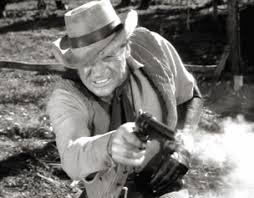I was almost named after David McLean's character, Tate, since my dad loved the series of the same name, but my mom thought it sounded too much like "Kate". Kids would tease of me, she feared, though I suppose at best and most, I would have gone through a basic A Boy Named Sue phase, and really, how bad would that have been?
Toughness, after all, is a virtue to old-schoolers like me, and keeping with that theme, McLean's character is without question one tough hombre, having use of only one arm, since the other was incapacitated during the Civil War.
It's never mentioned in the series which side Tate fought on. It's suffice enough to know that Tate is a bounty hunter, gunfighter and wanderer, arduous in manner yet compassionate to those deserving of a second chance: a damn good man on the visible whole.
Tate was a NBC/Kraft-sponsored, summer replacement for The Perry Como Show (June 8 - Sept 14, 1960, to be precise). Produced by Como's Roncon Video Films, the series ran for thirteen episodes, and should have gone on for a longer stretch, even for the sake of a syndicated run, but the show's brevity doesn't deter from its rich, character splendor, which is in step with such quality series as The Rifleman, The Rebel, Wanted Dead or Alive and Have Gun - Will Travel.
Tate, like many shows of the period, is packed with terrific guest stars, including James Coburn; Martin Landau; Leonard Nimoy; Royal Dano; Robert Culp; Frank Overton; Julie Adams; Peter Whitney; Cathy O'Donnell; Warren Oates; Lane Bradford; Louise Fletcher; Vaughn Taylor; Patricia Breslin; Richard Whorf; and in a couple, unconnected yarns, Robert Redford. (The aforementioned Whorf, as well as the celebrated Ida Lupino, directed various episodes.)
Tate is often a friend to those he encounters; at other times, an adversary. If need be, he's a bit of both. Tate is complex man, for all of his gallant stoicism, and much of this hardened allure stems from McLean's sharp, nuanced portrayal. (McLean, by the way, was the first Marlboro Man and later had starring roles in X-15, The Strangler, Nevada Smith, Deathsport and Kingdom of the Spiders.)
Of course, like other respected, cowpoke characters, Tate was a writer's concoction, conceived by Harry Julian Fink, who also created T.H.E. Cat, starring Robert Loggia, and Clint Eastwood's no-nonsense Dirty Harry. Tate's scenarios suited him to the tee, thanks to Fink and other writers' consistent injection of pensive grit and guts, married with a copious flow of blood and vengeance.
Several of Tate's episodes do, in fact, pull at the heartstrings, in particular those with Biblical allusions, but all of the show's confrontations are identifiable and multi-layered to please a wide audience. There's a heap of emotion packed into the series' under-thirty-minute installments, which resonate in ways that many longer, padded endeavors don't.
That the show's hero is disabled makes it extra-special to some, but this aspect seems only of grand acknowledgement (or exaltation) among those who watch the series within a current context. In its time, Tate's "handicap" was made known, but was never a matter of beat-it-into-the-ground, "woke" focus. It seemed only natural that Tate could hold his own in any circumstance, whether drawing a pistol (and hitting his mark with amazing accuracy) or chopping a foe to the ground with his one good arm in a matter of seconds.
For those interested, Tate's thirteen episodes can be found on YouTube. Episodes can also be purchased on DVD through oldies.com, GAC Video Classics and Timeless Media Group. (Even Amazon has a couple episodes queued to view for Prime subscribers.)
Take my word for it: Tate is a worth-while saga: a rough-edged, character study that anyone with a veritable backbone will be honored to watch and/or own.













No comments:
Post a Comment